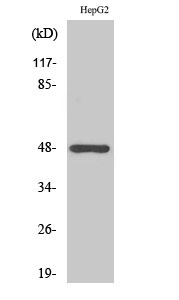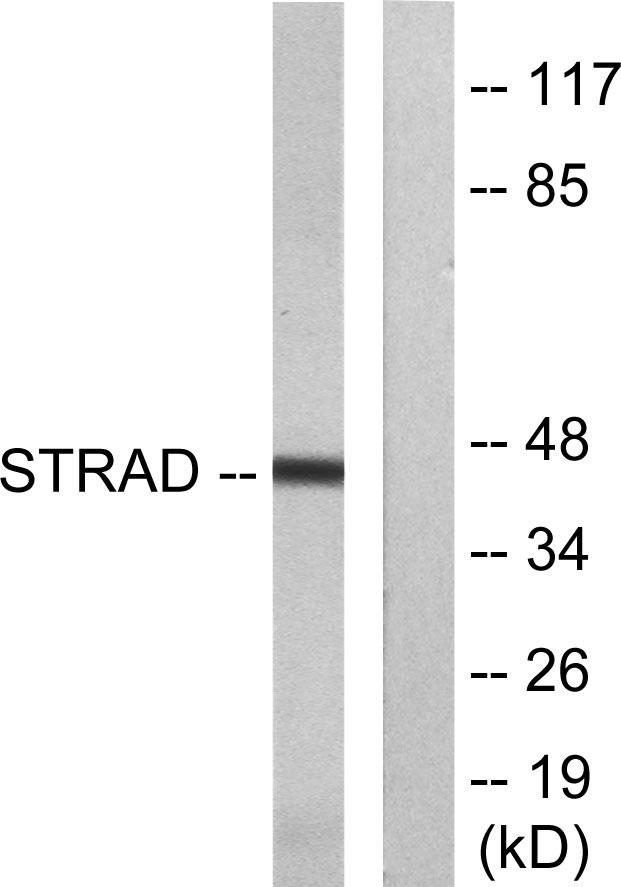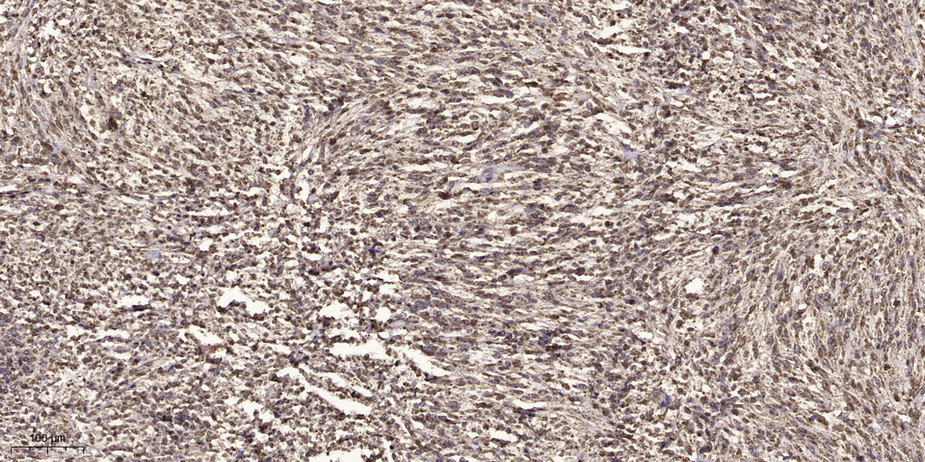Strad Polyclonal Antibody
- Catalog No.:YT4464
- Applications:WB; IHC; IF; ELISA
- Reactivity:Human;Mouse
- Target:
- Strad
- Fields:
- >>mTOR signaling pathway; >>AMPK signaling pathway
- Gene Name:
- STRADA
- Protein Name:
- STE20-related kinase adapter protein alpha
- Human Gene Id:
- 92335
- Human Swiss Prot No:
- Q7RTN6
- Mouse Gene Id:
- 72149
- Mouse Swiss Prot No:
- Q3UUJ4
- Immunogen:
- The antiserum was produced against synthesized peptide derived from human STRAD. AA range:11-60
- Specificity:
- Strad Polyclonal Antibody detects endogenous levels of Strad protein.
- Formulation:
- Liquid in PBS containing 50% glycerol, 0.5% BSA and 0.02% sodium azide.
- Source:
- Polyclonal, Rabbit,IgG
- Dilution:
- WB 1:500 - 1:2000. IHC 1:100 - 1:300. ELISA: 1:10000.. IF 1:50-200
- Purification:
- The antibody was affinity-purified from rabbit antiserum by affinity-chromatography using epitope-specific immunogen.
- Concentration:
- 1 mg/ml
- Storage Stability:
- -15°C to -25°C/1 year(Do not lower than -25°C)
- Other Name:
- STRADA; LYK5; STRAD; STE20-related kinase adapter protein alpha; STRAD alpha; STE20-related adapter protein; Serologically defined breast cancer antigen NY-BR-96
- Observed Band(KD):
- 46kD
- Background:
- The protein encoded by this gene contains a STE20-like kinase domain, but lacks several residues that are critical for catalytic activity, so it is termed a ' pseudokinase' . The protein forms a heterotrimeric complex with serine/threonine kinase 11 (STK11, also known as LKB1) and the scaffolding protein calcium binding protein 39 (CAB39, also known as MO25). The protein activates STK11 leading to the phosphorylation of both proteins and excluding STK11 from the nucleus. The protein is necessary for STK11-induced G1 cell cycle arrest. A mutation in this gene has been shown to result in polyhydramnios, megalencephaly, and symptomatic epilepsy (PMSE) syndrome. Multiple transcript variants encoding different isoforms have been found for this gene. Additional transcript variants have been described but their full-length nature is not known. [provided by RefSeq, Sep 2009],
- Function:
- disease:Deletions involving STRADA are the cause of polyhydramnios, megalencephaly, and symptomatic epilepsy syndrome (PMSE) [MIM:611087]. Affected children have large heads, infantile-onset intractable multifocal seizures and severe psychomotor retardation. Neuropathological studies reveal megalencephaly, ventriculomegaly, cytomegaly and extensive vacuolization and astrocytosis of white matter.,domain:The protein kinase domain is predicted to be catalytically inactive.,function:Pseudokinase which, in complex with CAB39, binds to and activates STK11. Relocates STK11 from the nucleus to the cytoplasm. Plays an essential role in STK11-mediated G1 cell cycle arrest.,similarity:Belongs to the protein kinase superfamily. STE Ser/Thr protein kinase family. STE20 subfamily.,similarity:Contains 1 protein kinase domain.,
- Subcellular Location:
- Nucleus . Cytoplasm .
- Expression:
- Lymph node,Mammary tumor,Synovial membrane tissue,Teratocarcinoma,U
- June 19-2018
- WESTERN IMMUNOBLOTTING PROTOCOL
- June 19-2018
- IMMUNOHISTOCHEMISTRY-PARAFFIN PROTOCOL
- June 19-2018
- IMMUNOFLUORESCENCE PROTOCOL
- September 08-2020
- FLOW-CYTOMEYRT-PROTOCOL
- May 20-2022
- Cell-Based ELISA│解您多样本WB检测之困扰
- July 13-2018
- CELL-BASED-ELISA-PROTOCOL-FOR-ACETYL-PROTEIN
- July 13-2018
- CELL-BASED-ELISA-PROTOCOL-FOR-PHOSPHO-PROTEIN
- July 13-2018
- Antibody-FAQs
- Products Images

- Western Blot analysis of various cells using Strad Polyclonal Antibody

- Western blot analysis of lysates from HepG2 cells, using STRAD Antibody. The lane on the right is blocked with the synthesized peptide.

- Immunohistochemical analysis of paraffin-embedded human small intestinal carcinoma tissue. 1,primary Antibody was diluted at 1:200(4° overnight). 2, Sodium citrate pH 6.0 was used for antigen retrieval(>98°C,20min). 3,Secondary antibody was diluted at 1:200



